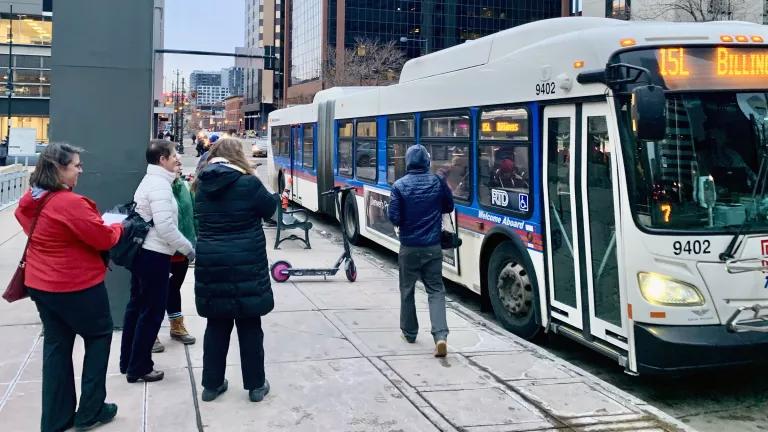First-of-Kind Study Shows Electric Trucks Are a Triple-Win

A first-of-kind, comprehensive study was released today assessing the environmental benefits and economics of various alternative fuel truck technologies.
The study, conducted by the international research firm ICF, demonstrates that electric trucks and buses are a triple-win in terms of helping meet California’s climate and air quality targets; the least cost to own and operate across nearly all truck and bus classes by 2030; and provide the greatest job and economic benefits to the state. The study was commissioned by NRDC and the California Electric Transportation Coalition (an industry group representing utilities and vehicle manufacturers) and was sponsored by the Union of Concerned Scientists, Earthjustice, BYD, Ceres, and NextGen Climate America. Advisory support was provided by East Yard Communities for Environmental Justice and University of California, Davis. A "Summary for Policymakers" can be found here together with a press release here.
Battery Electric Trucks Have the Lowest Total Cost of Ownership by 2030 or Earlier, Even Without Incentives
For fleet operators and owners today, battery electric trucks and buses (BETs) have an initial, upfront price premium versus a comparable diesel truck. But as the costs of battery packs—the single largest cost of an electric truck—and other components drop rapidly due to continuous improvements and economies of scale, the study finds that BETs will also decline such that by 2030 or earlier, they are the most attractive technology from a total cost of ownership (TCO) perspective for nearly all truck and bus classes, even without incentives. The TCO includes everything from the upfront costs for the truck and charging infrastructure, together with the operating and maintenance costs. ICF also finds that the costs of electricity as a fuel is important to the TCO. Attractive utility electricity rates for fleets, such as the ones adopted recently in California, are important to making electric trucks and buses attractive to fleets.
Fortunately for fleets in California, both clean vehicle incentives and clean fuel credits are available through the state’s Hybrid and Zero-Emission Truck and Bus Voucher Incentive Project (HVIP) and the Low Carbon Fuel Standard (LCFS) respectively. With these programs, nearly all truck and bus segments are already attractive today from a TCO perspective.The ICF authors find that over time, the costs of electric trucks decrease sufficiently that vehicle incentives are no longer as critical for an attractive TCO by 2030 or earlier. The fact that the highly popular HVIP program has been chronically oversubscribed points to the need for California to increase overall funding in order to deploy this clean technology at the pace needed.

Battery Electric Trucks Are the Cleanest Overall in Terms of Climate Change, Smog-Forming and Particulate Matter Pollution
The ICF study also found that across several alternative fuel scenarios, the battery electric truck scenarios (“Electricity”) resulted in the greatest total reductions in greenhouse gas emissions, oxides of nitrogen (NOx, a precursor to smog), and fine particulate matter (PM2.5). While the renewable diesel and renewable natural gas scenarios for trucks can achieve important emission reductions, constraints in resource availability limit the ability to achieve deep emission reductions across the state. Only aggressive zero-emissions truck scenarios, together with full implementation of existing NOx-reduction policies, come close or actually meet the states goals.


We must ACT now to reap the greatest job gains, pollution reductions, and monetary savings
Tomorrow, the Air Resources Board is considering the Advanced Clean Truck (ACT) rules which would require manufacturers to gradually increase the number of zero-emission trucks they supply to California starting in 2024. As my colleague has blogged on, if the current staff proposal is strengthened it would reduce pollution and help grow the economy even more.
As the ICF’s state economic and jobs analysis shows, electrification yields the largest job gains and economic growth among the scenarios analyzed due to the increased investments in electric truck and bus production and charging infrastructure, together with large fuel savings for fleet owners, among other factors. The state would observe even greater job and economic gains at higher deployment levels of battery electric trucks as show in the Figure below comparing the “Electricity” to the “Electricity Max” scenario over the 2019 to 2050 time period.

With medium and heavy-duty truck emissions growing rapidly across the globe—and now the fourth largest culprit for increased global emissions after the power sector, increased use of SUVs, and heavy industry—electrifying transport will be even more critical to slowing down climate change and improving air quality. As the ICF study shows, we can improve air quality and public health, reduce climate pollution, and save money. It’s time for state leaders to go all in on electric trucks.





